
Thousands of Greeks have come out to protest the expansion of U.S. military bases in Greece, arguing this will further destabilize the region and perilously enmesh Greece in endless imperialist wars. Since the arrival of Geoffrey Pyatt as the American ambassador to Greece in October 2016, the government in Athens, to the ire of many Greeks, has become more acquiescent toward U.S. designs in the Mediterranean.



(Left) Greeks protest the signing of the U.S.-Greek Mutual Defense Cooperation Agreement (MDCA) in Athens. (October 5, 2019) [Source: greekreporter.com]
(Right) As tensions escalate with Turkey, and the Greek parliament ratified the MDCA, supporters of the Greek Communist Party protest in central Athens against the expansion of U.S. military bases. (January 30, 2020) [Source: AP Photo/Petros Giannakouris]
Since the end of WWII, the U.S. has been actively trying to dominate both Greece and Turkey, intervening in Greece’s civil war under the Truman doctrine and then bringing both Turkey and Greece into NATO on October 17th and October 21st of 1951, respectively. Since then, the U.S. has played off Greece and Turkey against each other.
In 1967, the CIA orchestrated a fascist coup in Greece.[1] And when the new CIA-backed Greek junta organized a coup in Cyprus in 1974, Turkey intervened. The politics in Cyprus have remained contentious. Turkey, nevertheless, remains an important strategic territory for U.S. strategy in the region, both because of the massive U.S. airbase at Incerlik in Turkey and because Turkey is currently the headquarters of NATO’s Land Command.
Nevertheless, the geopolitical landscape in the Eastern Meditarranean has now changed because of (1) Turkish President Recep Tayyip Erdoğan’s growing ties to Russia, (2) his attacks on America’s Kurdish allies in Syria, and (3) his belief that the U.S. was behind the 2016 coup attempt to oust him from office.[2]
On October 5, 2019, U.S. Secretary of State Mike Pompeo and Greek Foreign Minister Nikos Deridias signed the Mutual Defense Cooperation Agreement whereby Greece allowed the U.S. to (1) expand a deep water naval base used by the U.S. 6th fleet in Crete and (2) invest heavily in a new naval and air force base in Alexandroupolis, which is emerging as a regional energy center.[3]

The Greeks signed the deal because their defense budget was cut virtually in half during the country’s eight-year financial crisis. They now have access to better military facilities and can wield strategic advantage over Turkey while easening their defense burden.[4] Further, Greece has begun talks to procure at least 24 fifth-generation F-35 warplanes from the U.S. for $3 billion at a time when Turkey has been suspended from purchasing F-35s.[5]

Pyatt stated after the defense agreement was signed:
Together with Greece and other democratic partners, we are working to push back on malign actors like Russia, China and Iran [that] have different interests and values and different visions for the future of this region.[6]
These comments suggest a new Cold War imperative underlying the U.S. militarization of Greece and an effort to divide the world between so-called pro- and anti-democracy forces.
Thousands of Greeks feel differently, calling on Mike Pompeo to go home as they protested the defense agreement in Athens. Dimitris Koutsoumpas, general secretary of the Communist Party of Greece (KKE), said,
The signing of the new agreement between Greece and the U.S., and in particular the maintenance and expansion of U.S. military bases in Greece, will only lead to even greater insecurity for the Greek people and further destabilize the region, with an even greater involvement in interventions, overseas missions and imperialist wars. That’s why we have proclaimed ‘no’ to all of them today.[7]
Geoffrey Pyatt – The Quiet American
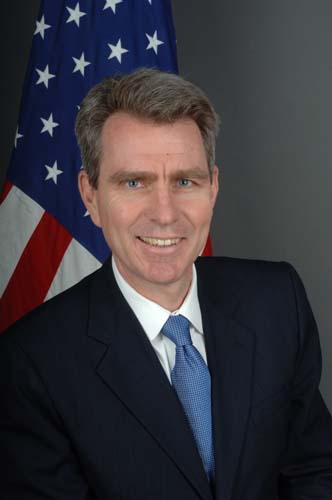
In background and temperament, the U.S. Ambassador to Greece, Geoffrey Pyatt, is not too different from Alden Pyle, the protagonist in Graham Greene’s famous novel The Quiet American who is so convinced of the righteousness of his cause that he will employ ruthless methods to advance it.[8]
Pyatt grew up in beautiful La Jolla Beach in San Diego and is the son of Kedar “Bud” Pyatt, a nuclear scientist widely known in certain scientific circles as the chief mathematician of the Orion Project, an ambitious U.S. government program of the 1950s that aimed to construct spaceships 400 meters wide and destined to travel the solar system fueled by nuclear energy.[9]
In 1987, Pyatt obtained his Master’s degree in international relations from Yale University, a breeding ground for the American foreign policy elite. Pyatt’s principal mentor was historian Gaddis Smith, whom Pyatt said helped him to “think about the role of the U.S. in the international system.”[10] Smith was a Cold warrior who penned a defense of U.S. Secretary of State Dean Acheson, one of the major architects of the Cold War who helped guide the U.S. military intervention in Greece during the Greek Civil War (1947-1952).[11]
Pyatt began his diplomatic career in Honduras in the early 1990s,[12] just after the conclusion of the Contra War, when the U.S. provided military and police aid to the government of Rafael Callejas, which granted impunity to death squad operatives who had carried out major human rights crimes in the 1980s.[13]

In 2006, Pyatt became deputy chief of diplomatic mission in India, and served as Principal Deputy Assistant Secretary of the Bureau of South and Central Asian Affairs from May 2010 until July 2013.[14] In the latter capacity, Pyatt helped court ruthless dictators such as Nursultan Nazarbayev of Kazakhstan, Islam Karimov of Uzbekistan, and Ilham Aliyev of Azerbaijan as a means of gaining advantage over Russia in helping U.S. corporations access lucrative oil and gas deposits and in securing military bases that could be used to assist the war in Afghanistan.[15]
Pyatt went on to supervise the February 2014 Maidan coup as U.S. ambassador to Ukraine. The American embassy under Pyatt had encouraged right-wing protesters who overthrew the legally elected pro-Russian President Viktor Yanukovych after they could not get enough signatures to push for the latter’s impeachment. The coup resulted in the secession of Ukraine’s eastern provinces and a brutal civil war, which drew in Russia.[16]
In January 2014, a conversation between Pyatt and Victoria Nuland, the Assistant Secretary of State for European and Eurasian Affairs, was intercepted and posted on YouTube. In the conversation, Pyatt talks about imposing a pro-Western leader on Ukraine and agrees with Nuland when she said: “Fuck the EU.”[17]
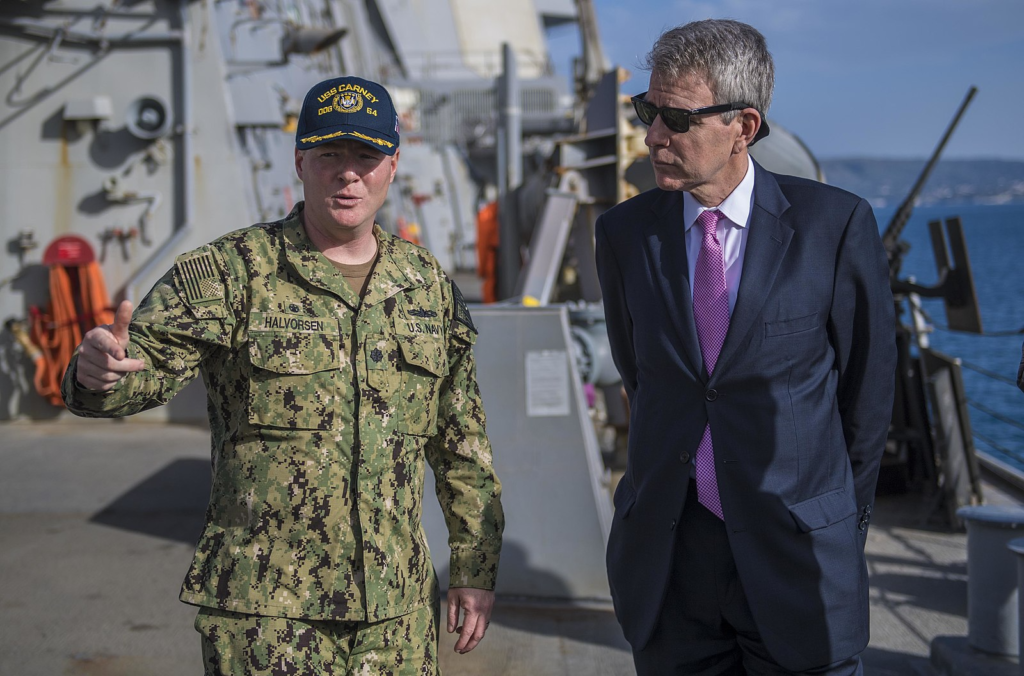
Pyatt’s career experience, background and foreign policy outlook has prepared him well to advance U.S. strategic designs in Greece. The latter’s aim is to draw the country more into the American orbit at a time of growing geopolitical rivalry with Russia and to use newly established military platforms to project U.S. power in present and future wars. Pyatt conveys an air of innocence about him, emphasizing for public relations purposes his hobby of cycling across the Greek countryside and admiration for Greek geography and culture.[18]

However, beneath the liberal and humanitarian veneer lies a seasoned political operative and ideologue who is committed to transforming Greece into a neo-colonial client for U.S. strategic and corporate interests.
Containment of Turkey and Expansion of U.S. Military Base Network in Greece
Pyatt arrived in Greece in October 2016 following the July 15, 2016, ‘’Gulen coup’’ in Turkey, which was put down by Turkish President Erdoğan. Breaking from Erdoğan’s Justice and Development Party (AKP), the coup plotters were followers of Fethlullah Gülen – a Sunni cleric who had been charged in 2000 with trying to undermine Turkish secularism and setting up a network of schools while living in the Pocono mountains of Pennsylvania.[19]
The year of the coup, Erdoğan’s government bought the S-400 anti-missile system from Russia in a move that signalled its turn away from the United States. Since 1951, Turkey had been a key strategic ally of the U.S., housing the Incirlik Air Base, which was pivotal to U.S. power projection in the Middle East and provided a launching pad for bombing attacks into Iraq during the Persian Gulf Wars.[20]
In this panorama, the U.S. bases in Turkey, though still part of the official headquarters of NATO’s Land Armies in Europe, have begun to lose their importance relative to Greece. Already under the left-wing government of Alexis Tsipras (2015-2019),[21] which had come to power vowing to limit the U.S. military presence in Greece, the then Exterior Minister Nikos Kotzias signed an agreement for the expansion of U.S. bases in Greece in the context of the strengthening of Greek-U.S. relations.[22]

Since 2019, the elected Greek government of the center-right New Democracy Party under Kyriakos Mitsotakis, renewed the deals allowing the U.S. military presence in Greece and appointed Panayotis Kontoleon, a former employee of the U.S. embassy in Greece, as Chief of the Greek National Intelligence Service (NIS) (Ethnikí Ypiresía Plhoroforión EYP). This demonstrates the level of Greece’s dependency on Geoffrey Pyatt and the U.S. government.

The U.S. military has now been granted permission to create three additional bases in Greece, apart from the presence of the U.S. 6th Fleet in Souda, Crete. The new bases are located in Volos and Larissa in Central Greece and in Alexandroupolis in the northern coast of the Aegean in Thrace, Greece. In the military spectrum, the U.S. intends to control the Eastern Mediterranean and the Balkan peninsula toward the Black Sea.
In order to control the whole region, the U.S. has been and will continue to employ the AWACS (Airborne Warning And Control System–a mobile, long-range radar surveillance and control center), stationed in Western Greece, in the Aktion airport.
The aforementioned bases will be used as forward intelligence stations, employing Unmanned Aerial Vehicles (UAVs), ships and attack helicopters.[23]
The U.S. has considered these bases indispensable, especially after the latest developments in the Middle East and as a result of the Russian annexation of Crimea following the 2014 Maidan coup in Ukraine. Crimea is considered a dangerous Russian ‘’port’’ which supports access to the Mediterranean.
At the same time, Athens considers these bases necessary as defensive positions against any military aggression from Ankara. Relations between Greece and Turkey have been marked by alternating periods of hostility and reconciliation since Greece won its independence from the Ottoman Empire in 1830. The two countries have fought each other in four major wars (Greco-Turkish War of 1897; Balkans War of 1912/3; World War I and Greco-Turkish War of 1922), and clashed over the island of Cyprus.[24] Military tensions have risen again due to conflicts over maritime zones in the Aegean and Eastern Mediterranean, and over drilling rights for gas in waters claimed by Cyprus. The U.S. now sides with the Greeks in these latter disputes, representing a major shift from just a few years ago.[25]
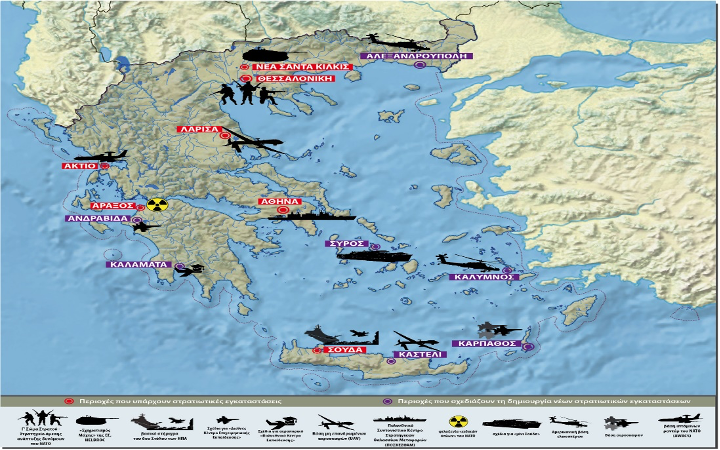
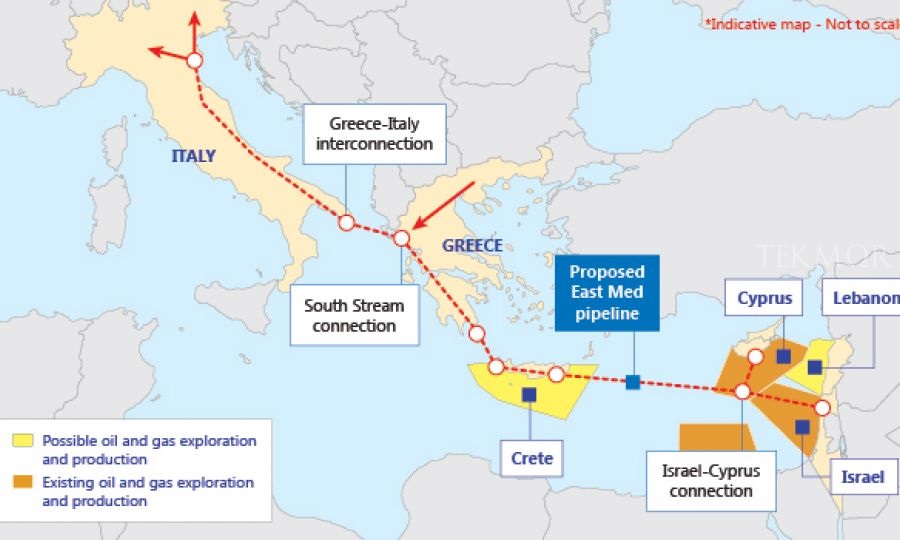
The U.S. and Greece: Historic Relationship
The U.S. Navy has shared the use of a naval base at Souda Bay on Crete since the 1950s. At the time, the U.S. was providing nearly $1 billion under the Truman doctrine to Greek monarchist forces in the civil war fighting against leftists who helped to defeat pro-Nazi elements during World War II. Secretary of State George C. Marshall advocated for “stern and determined measures” to defeat the pro-communist ELAS. These measures included torture in island concentration camps and execution by firing squad.[26]
Greece at this time became well-integrated into the NATO system, sending troops to assist the U.S. in fighting the Korean War. In the early 1960s, when Prime Minister Andreas Papandreou wanted to end Greece’s status as a client of the West and pull out of NATO, the CIA helped to install Georgios Papadopoulos in a 1967 coup, which led to the declaration of martial law and gruesome torture using American-made instruments.[27] Papandreou came back to power in the early 1980s, though he was co-opted into signing an agreement allowing for the retention of four U.S. military bases and smaller installations on Greek soil.[28]
The debt crisis which has prompted the signing of this more recent defense pact had been driven in part by Goldman Sachs, which in the early 2000s, secretly helped Greece keep billions of dollars of debt off their balance sheet through the use of complex financial instruments like credit default swaps. This allowed Greece to meet the baseline requirements to enter the Eurozone. But it also helped create a debt bubble that would later explode and bring about the current economic crisis, which the Trump administration is now exploiting to further its own imperial ambitions.[29]
The U.S. Army’s Locations
With the renewal of the defensive cooperation between the U.S. and Greece in October 2019, and with the Greek Parliament’s approval of it, the U.S. troops will have a reinforced presence in Greece from north to south.
Souda Base
The deal aims to improve the existing military facilities and infrastructure, especially in Souda, Crete. Souda, is the largest and most important U.S. military naval base in the Eastern Mediterranean. The base contains, apart from military vessels and an aircraft carrier, cargo and transport ships for U.S. Special Forces and Navy Seals and functions as a naval fuelling station and training and missile testing center. Moreover, Souda is the only maritime base in the Mediterranean that can support a nuclear aircraft carrier.[30]
Souda Bay is considered a place of great strategic importance because of its location between Europe, Africa, and Asia and constitutes a base of supply and logistics for the U.S. forces in the Mediterranean. The U.S. engineer corps has been constructing and expanding the dock K14, where the aircraft carriers are resupplied for any missions in the region. Militarily, Souda docks have been extensively used by the U.S. Navy operations in Libya, during NATO’s 2011 intervention against Muammar Gaddafi. Also, the U.S. Air Force has been using the base for attack operations in Libya and Syria as well as Afghanistan and Iraq.[31]
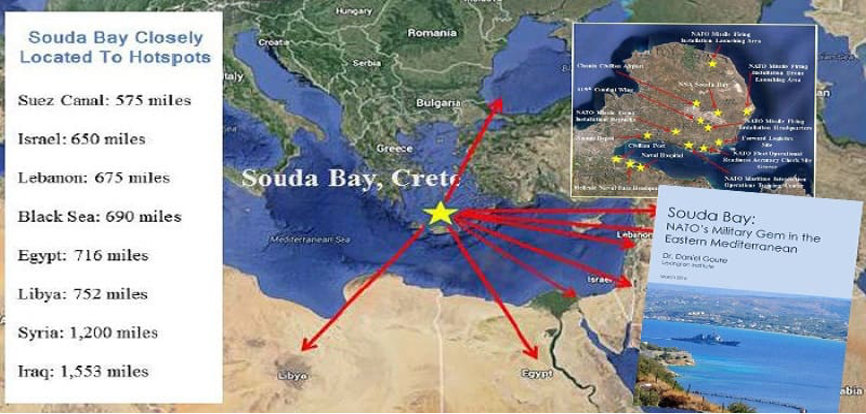
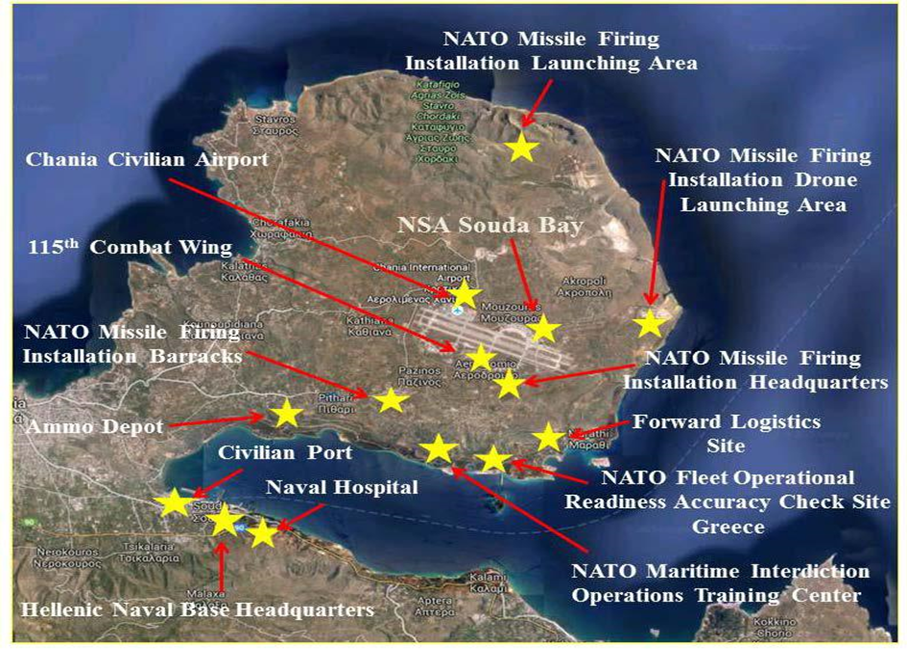
Larissa Base
At the air base of Larissa, concretely in the 110th Battle Section, the U.S. Air Force has deployed many UAVs such as the MQ-9 Reaper, capable of spying at very high altitudes. In December 2019, the U.S. forces made an exhibition of their aerial capacities to their Greek counterparts for common training and possible future purchase.[32]
Stefanovikio Volos Base
In the 1st Brigade’s Military Airforce in Stefanivikio, Volos, many U.S. helicopters have been placed since 2018-19. Since March 2019, the U.S. forces have had a permanent base there alongside their Greek counterparts, with whom they train mutually. Concretely, around 35 transport and attack helicopters are stationed there such as Chinooks, Kiowa Romeo, Apaches and Black Hawks.[33] On January 31, the Greek Parliament approved the defense agreement with the U.S. (MDCA) with 175 votes in favor, 33 against and 80 declaring ‘’present’’ out of the 298 voting MPs. In this context, the Stefanovikio base houses the 1st Air Transport Brigade of Greece and, since March, around 510 U.S. Marines that have been participating in mutual exercises as the agreement stipulates.[34]
Moreover, the 3d Marine Aviation Brigade is stationed there and has made extensive preparations for common exercises with the Greek Marines. It is also worth noting that Greece purchased several Kiowa reconnaissance helicopters in March 2019 from the U.S.
In the official delivery of these helicopters in Stefanovikio base, Geoffrey Pyatt gave a fiery speech about the strengthening of U.S.-Greek relations. Pyatt stated:
Stefanovikio, which is specifically designated in this enhanced MDCA, is now formally a place where the United States can expand the scope of what we do, and I expect next year, we will see an even more robust and impressive U.S. presence here.[35]
The modern-day “Quiet American,” as these statements indicate, is an arch-militarist who sees the 2019 defense pact as the beginning of something much greater.

Alexandroupolis
A coastal town of Northern Greece to the Aegean, close to the Turkish borders, Alexandroupolis constitutes a strategic location for the U.S. interests in the wider region. It is a transport hub of energy resources throughout the Balkans. It has a storage facility for natural gas and Greece will soon start building a gas pipeline that will connect to Bulgaria and enable shipments of U.S. liquified natural gas to the Balkans, upsetting a Russian monopoly.[36]
The Syriza and New Democracy governments, alongside Geoffrey Pyatt, have collaborated in bringing U.S. military personnel and drones to the port of Alexandroupolis. Pyatt has already visited the city five times in order to inspect the newly acquired land and the port which will play a crucial role for U.S. spying intelligence in the Aegean and, especially, the Black Sea.
U.S. helicopters (UH-60s) were transported from Alexandroupolis after the NATO military drills ‘’Carpathian Eagle’’ in 2017 and ‘’Atlantic Resolve’’ in 2019. In 2017, the Greek government agreed to the creation of a helicopter base with the creation of a platform for the assembly and dismantlement of U.S. helicopters. Such a base exists only in Germany.[37] Apart from military drills, U.S. companies have a clear interest in shipping liquified natural gas through the aforementioned port and pipeline. Recently, on July 23, Geoffrey Pyatt visited Alexandroupolis for the commemoration of the city port’s 170th anniversary. This clearly shows U.S. ambitions for the city’s port and pipeline and for its military use, especially after the deterioration of U.S.-Turkey relations.
More U.S. Projects for Further Military Bases
In the military airport of Araxos, in southwestern Greece, there are plans for re-opening a U.S. base that was dismantled after the end of the Cold War. The further deterioration of relations between the U.S. and Turkey has reignited interest from the U.S. military to re-open the base and transfer the 50 nuclear warheads from Incirlik in Turkey to the Araxos base.
As for the Aegean, Greek governments had orally expressed their permission for leasing land in Syros Island in the Central Aegean, which would be used for construction of a new naval base. In the Karpathos and Kalymnos islands, the U.S. government is also planning to open a helicopter and aircraft base.[38]
Other Key players in the Region
Strengthened ties between Israel and Greece are helping to further U.S. strategic ambitions in the Mediterranean. On January 2, 2020, Greece, Cyprus, and Israel signed a deal to build a 1,900 km (1,180 mile) subsea pipeline to carry natural gas from the eastern Mediterranean’s rapidly developing gas fields to Europe.[39] The deal comes in the wake of the 2019 Congressional legislation to fund the “Eastern Mediterranean Security and Energy Partnership Act of 2019,” which CAM reported on last year in its article entitled “Eastern Mediterranean Project: U.S. Plans to Curb Russia from Region.” The Proposed East Med Pipeline graphic above displays the future pipeline and locations of oil and gas. Despite a momentary setback for this project, Israel has found ways to expand its military through Cyprus and Crete. In Cyprus, Israeli forces have trained the Cypriot National Guard in ‘’counter-terrorist’’ operations, and the Israel Defense Forces (IDF) has also conducted drills with the Greek Air Force and with U.S. forces stationed at Souda Bay.
According to a Reuters report, a Russian S-300 anti-aircraft system, sold to Cyprus 18 years ago but now located on Crete, had been activated during joint drills between the Greek and Israeli air forces in April-May 2018. The activation allowed Israel’s warplanes to test how the S-300s lock-on system works, gathering data on its powerful tracking radar and how it might be blinded or bluffed.[40]
One defense source in the region said Greece had done so at the request of the United States on at least one occasion in the past year. Israel’s incursions into Syria could be the main reason for these drills since Syria maintains several S-300 Air Defense Systems.
Both wittingly and unwittingly, Israel appears to be serving as a key strategic proxy for the U.S. in the Mediterranean. In hindsight, Pyatt’s arrival as ambassador marked the turning point for (1) the U.S. strategic shift to Greece as a key ally in the region, (2) the militarization of the country and (3) the transforming of Greece into a neo-colonial client for U.S. strategic, geopolitical and corporate interests.
Silently but methodically, the Trump administration has managed to secure Greece as a substantial territory for future military operations in the Mediterranean, in the Middle East and, above all, in the Black Sea. And the Greeks, weakened by debt and consumed by their rivalry with Turkey, have been unable to effectively resist.

[1] Marlise Simons, “Andreas Papandreou, Greek Leftist Who Admired and Annoyed U.S., Dies at 77,” The New York Times, June 24, 1996, https://www.nytimes.com/1996/06/24/world/andreas-papandreou-greek-leftist-who-admired-and-annoyed-us-diesat-77.html; William Blum, Killing Hope: U.S. Military and CIA Interventions Since World War II (Monroe, ME: Common Courage Press, 2004), 34-39.
[2] Alex Ward, “How America’s Relationship with Turkey Fell Apart: The NATO Allies’ Partnership Has Devolved Into a ‘Slow Motion’ Car Crash,” Vox, April 11, 2019, https://www.vox.com/world/2019/4/11/18292070/usa-turkey-trump-erdogan-s400
[3] Helena Smith, “Pompeo Hails ‘New Era’ with Greece After Signing Revised Defense Deal,” The Guardian, October 6, 2019, https://www.theguardian.com/us-news/2019/oct/06/mike-pompeo-greece-revised-defense-deal
[4] Vissilis Nedos, “Ex-Minister Apostolakis Hails U.S.-Greece Defense Deal,” Ekathimerini.com, June 10, 2019, https://www.ekathimerini.com/245223/article/ekathimerini/news/ex-minister-apostolakis-hails-us-greece-defense-deal; John Psaropoulos, “US, Greece hail strategic relationship after signing defence deal,” Al Jazeera, October 5, 2019, https://www.aljazeera.com/news/2019/10/greece-hail-strategic-relationship-signing-defence-deal-191005175854999.html.
[5] Anthee Carassava, “Greece to Buy Warplanes, Battleships to Boost Defense Against Turkey,” Voice of America, September 13, 2020, http://www.globalsecurity.org/military/library/news/2020/09/mil-200913-voa02.htm?_m=3n%2e002a%2e2883%2ezx0ao0f3rr%2e2nwh
[6] Smith, “Pompeo Hails ‘New Era’ with Greece After Signing Revised Defense Deal.”
[7] “Greeks take to the streets in large numbers against visit of Mike Pompeo,” People’s Dispatch, October 8, 2019, https://peoplesdispatch.org/2019/10/08/greeks-take-to-the-streets-in-large-numbers-against-visit-of-mike-pompeo/
[8] Graham Greene, The Quiet American (London: Heinemann, 1955).
[9] Parlos Papadopoulos, “US Ambassador Geoffrey Pyatt: ‘Coming to Greece Was Like Coming Home,’” Greece Is, September 10, 2020, https://www.greece-is.com/us-ambassador-geoffrey-pyatt-coming-to-greece-was-like-coming-home/
[10] “Alumni Spotlight: The Whitney and Betty McMillan Center For International and Area Studies at Yale,” Fall 2006, https://southasia.macmillan.yale.edu/news/alumni-spotlight-geoffrey-pyatt
[11] Gaddis Smith, Dean Acheson (New York: Cooper Square Publishers, 1972).
[12] https://en.wikipedia.org/wiki/Geoffrey_R._Pyatt. Another of Smith’s books criticized Jimmy Carter for being too weak and inept in foreign policy.
[13] “Human Rights Developments – Honduras, 1992,” https://www.hrw.org/reports/1992/WR92/AMW2-01.htm
[14] https://en.wikipedia.org/wiki/Geoffrey_R._Pyatt
[15] See Alexander Cooley and John Heathershaw, Dictators Without Borders: Power and Money in Central Asia (New Haven: Yale University Press, 2017); Eugene Rumer, Richard Sokolsky, and Paul Stronski, “U.S. Policy Towards Central Asia 3.0,” Carnegie Endowment for International Peace, January 25, 2016, https://carnegieendowment.org/2016/01/25/u.s.-policy-toward-central-asia-3.0-pub-62556
[16] On these events, see Richard Sakwa, Frontline Ukraine: Crisis in the Borderlands (London: I.B. Tauris, 2016).
[17] Abby Ohlheiser, “State Department Official Caught on Tape Saying F*ck the EU,” The Atlantic, February 6, 2014, https://www.theatlantic.com/politics/archive/2014/02/state-department-official-caught-tape-saying-f-eu/357812/
[18] Parlos Papadopoulos, “US Ambassador Geoffrey Pyatt “Coming to Greece Was Like Coming Home,’” Greece Is, September 10, 2020, https://www.greece-is.com/us-ambassador-geoffrey-pyatt-coming-to-greece-was-like-coming-home/ [NOTE: Why is the number of the footnote (18) in larger type?]
[19] Dylan Matthews, “Turkey’s Coup: the Gulen Movement, Explained,” Vox, September 13, 2016, https://www.vox.com/2016/7/16/12204456/gulen-movement-explained. Whether the CIA was behind the Gulen coup has not been confirmed, but Turkish prosecutors sought the arrest of CIA operative Graham Fuller, who had links to Gulen, for trying to overthrow the Turkish government. “Turkey Seeks Arrest of Ex-CIA Officer Fuller Over Coup Plot,” BBC, December 1, 2017, https://www.bbc.com/news/world-europe-42198399
[20] Ayse Gul Altmay and Amy Holmes, “Opposition to the U.S. Military Presence in Turkey in the Context of the Iraq War,” In The Bases of Empire: The Global Struggle Against U.S. Military Posts, Catherine Lutz , Ed.(New York: New York University Press, 2009), 276.
[21] SYRIZA, ANEL government, 2015-2019.
[22] See “Once Anti-American, Syriza’s Greece Invites U.S. Military Presence,” The National Herald, July 2, 2019, https://www.thenationalherald.com/archive_whats_new/arthro/once_anti_american_syriza_s_greece_invites_us_military_presence-15895/ [NOTE: On the website it is “Once Anti-American, SYRIZA’s Greece Invites US Military Presence”]
[23] https://www.rovespieros.gr/olokliri-ellada-natoiki-vasi/
[24] https://en.wikipedia.org/wiki/Greek%E2%80%93Turkish_relations#cite_note-170
[25] Michele Kambas, Tuvan Gumrukcu, “Greek, Turkish Warships in ‘Mini Collision’ Ankara Calls Provocative,” Reuters, August 14, 2020, https://www.reuters.com/article/us-greece-turkey-warships/greek-turkish-warships-in-mini-collision-ankara-calls-provocative-idUSKCN25A161; Dave De Camp, “US and Greece Sign New Defense Pact: Deal Means New US Military Bases, Pompeo Calls on Turkey to Stop Illegal Drilling,” Antiwar.com, October 6, 2019, https://news.antiwar.com/2019/10/06/us-and-greece-sign-new-defense-pact/
[26] See Lawrence Wittner, American Intervention in Greece, 1943-1949 (New York: Columbia University Press, 1982); Jeremy Kuzmarov, Modernizing Repression: Police Training and Nation Building in the American Century (Amherst, MA: University of Massachusetts Press, 2012), 190-193; William Blum, Killing Hope: U.S. Military and CIA Interventions Since World War II (Monroe, ME: Common Courage Press, 2004), 34-39.
[27] William Blum, “Anti-Empire Report #137,” February 13, 2015, https://williamblum.org/aer/read/137. Papandreou once called the United States the “expansionist Mecca of imperialism.”
[28] Marlise Simons, “Andreas Papandreou, Greek Leftist Who Admired and Annoyed U.S., Dies at 77,” The New York Times, June 24, 1996, https://www.nytimes.com/1996/06/24/world/andreas-papandreou-greek-leftist-who-admired-and-annoyed-us-diesat-77.html
[29] William Blum, “Anti-Empire Report #137,” February 13, 2015, https://williamblum.org/aer/read/137
[30] See Daniel Goure, Souda Bay: NATOs Military Gem in the Eastern Mediterranean (Lexington Institute, March 2016), https://www.lexingtoninstitute.org/wp-content/uploads/2016/03/Souda-Bay-NATOs-Military-Gem.pdf
[31] Goure, Souda Bay.
[32] https://www.in.gr/2020/02/02/politics/diplomatia/aytes-einai-oi-vaseis-pou-tha-exoun-oi-amerikanoi-stin-ellada/
[33] https://www.eleftheria.gr
[34] https://www.ekathimerini.com/249705/article/ekathimerini/news/joint-military-exercises-evidence-of-us-commitment-to-greece-alliance-says-pyatt
[35] https://www.ekathimerini.com/249705/article/ekathimerini/news/joint-military-exercises-evidence-of-us-commitment-to-greece-alliance-says-pyatt
[36] Psaropoulos, “U.S., Greece Hail Strategic Relationship After Signing Defense Deal.”
[38] https://www.rizospastis.gr/story.do?id=9805375
[39] Angeliki Koutantou, “Greece, Israel, Cyprus Sign EastMed Gas Pipeline Deal,” Reuters, January 2, 2020, https://www.reuters.com/article/us-greece-cyprus-israel-pipeline/greece-israel-cyprus-sign-eastmed-gas-pipeline-deal-idUSKBN1Z10R5
[40] https://www.reuters.com/article/us-mideast-crisis-israel-greece/israel-trained-against-russian-made-air-defense-system-in-greece-sources-idUSKBN0TN10G20151204
CovertAction Magazine is made possible by subscriptions, orders and donations from readers like you.
Blow the Whistle on U.S. Imperialism
Click the whistle and donate
When you donate to CovertAction Magazine, you are supporting investigative journalism. Your contributions go directly to supporting the development, production, editing, and dissemination of the Magazine.
CovertAction Magazine does not receive corporate or government sponsorship. Yet, we hold a steadfast commitment to providing compensation for writers, editorial and technical support. Your support helps facilitate this compensation as well as increase the caliber of this work.
Please make a donation by clicking on the donate logo above and enter the amount and your credit or debit card information.
CovertAction Institute, Inc. (CAI) is a 501(c)(3) non-profit organization and your gift is tax-deductible for federal income purposes. CAI’s tax-exempt ID number is 87-2461683.
We sincerely thank you for your support.
Disclaimer: The contents of this article are the sole responsibility of the author(s). CovertAction Institute, Inc. (CAI), including its Board of Directors (BD), Editorial Board (EB), Advisory Board (AB), staff, volunteers and its projects (including CovertAction Magazine) are not responsible for any inaccurate or incorrect statement in this article. This article also does not necessarily represent the views the BD, the EB, the AB, staff, volunteers, or any members of its projects.
Differing viewpoints: CAM publishes articles with differing viewpoints in an effort to nurture vibrant debate and thoughtful critical analysis. Feel free to comment on the articles in the comment section and/or send your letters to the Editors, which we will publish in the Letters column.
Copyrighted Material: This web site may contain copyrighted material the use of which has not always been specifically authorized by the copyright owner. As a not-for-profit charitable organization incorporated in the State of New York, we are making such material available in an effort to advance the understanding of humanity’s problems and hopefully to help find solutions for those problems. We believe this constitutes a ‘fair use’ of any such copyrighted material as provided for in section 107 of the US Copyright Law. You can read more about ‘fair use’ and US Copyright Law at the Legal Information Institute of Cornell Law School.
Republishing: CovertAction Magazine (CAM) grants permission to cross-post CAM articles on not-for-profit community internet sites as long as the source is acknowledged together with a hyperlink to the original CovertAction Magazine article. Also, kindly let us know at info@CovertActionMagazine.com. For publication of CAM articles in print or other forms including commercial internet sites, contact: info@CovertActionMagazine.com.
By using this site, you agree to these terms above.
About the Author
Andrew Lee is an independent researcher and historian who studies the far-right parties in Greece and the wider region of the Balkans.











Pyatt seems to be one of those CIA agent/ambassadors at large, who show up at key places. He was part of the 2014 Ukraine coup, run by the Obama team, that worsened relations with Russia. Trump opposed this, so why did he retain Pyatt as Ambassador to Greece? For those unfamiliar with the Ukraine coup:
https://www.youtube.com/watch?v=nW7lNABfDVk&